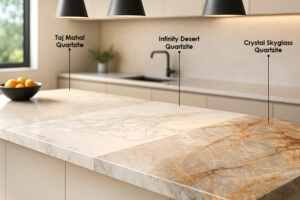When selecting the ideal countertop material for your kitchen or bathroom, understanding the key differences between options can simplify your decision. Granite is renowned for its exceptional durability and minimal maintenance. Marble, while offering timeless elegance, requires more care to prevent staining. Quartz, on the other hand, blends stylish appeal with hassle-free upkeep, making it a versatile choice for many homeowners. In this post, we’ll guide you through the decision-making process—considering factors such as budget, lifestyle, and design preferences—to help you choose the countertop material that best enhances your home.
Durability over Everything
When choosing countertops for your kitchen or bathroom, durability is often a key consideration—especially in high-traffic areas frequently exposed to spills, stains, and scratches. Granite stands out as an excellent option, offering long-lasting resilience without sacrificing elegance.
As a natural stone, granite is well-known for its strength. It can handle high temperatures with ease, allowing you to place hot pans directly on the surface without risk of damage—making it particularly well-suited for kitchens. Additionally, when properly sealed, granite resists stains and inhibits bacteria growth, which is essential for maintaining a hygienic food preparation environment.
Granite also offers remarkable design versatility. With an extensive range of colors and natural patterns—from rich blacks and warm golds to earthy browns and soft greys—there’s a style to match virtually any décor. Each slab is uniquely patterned, adding a distinctive, luxurious touch to your kitchen or bathroom.
Maintaining granite countertops is relatively simple. While they do require sealing upon installation, resealing every one to two years—depending on usage—helps preserve their protective surface. For daily upkeep, a soft cloth and mild detergent are all you need to keep them looking pristine.
Beyond material selection, your choice of finish—honed or polished—also plays a role in durability and maintenance. Each finish offers unique benefits and aesthetic appeal. Explore the key differences between honed and polished granite to determine which is best for your space.
Granite, Quartz, and Marble Countertops
The Classic Choice
Marble countertops exude a timeless elegance that has made them a beloved choice for kitchens and bathrooms for generations. Their classic beauty and distinctive veining lend a sense of luxury and sophistication to any space. Here’s a closer look at what makes marble so enduringly appealing.
Timeless Beauty and Versatility
Marble is often associated with luxury and timeless appeal. Its natural veining and diverse color palette—ranging from crisp whites and gentle pinks to rich greens and moody greys—create a striking visual impact that enhances any interior. Each slab of marble features unique, organic patterns, ensuring that no two countertops are exactly alike. This individuality lends a distinctive charm, making marble a versatile choice that beautifully complements both traditional and modern décor styles.
Durability with Care
While marble may not match granite in hardness, it is still a durable natural stone that can withstand the test of time with proper care. Its porous nature, however, makes it more susceptible to staining—especially from acidic substances like wine, lemon juice, or vinegar. Fortunately, with regular cleaning and periodic sealing, marble can maintain its refined beauty and remain a stunning feature in your home for many years.
Maintenance and Upkeep
The key to preserving marble’s beauty lies in consistent maintenance:
- Seal Regularly:
Marble countertops should be sealed at installation and resealed annually to protect against staining and etching. The frequency may vary depending on the stone’s porosity and how heavily the surface is used.
- Clean Spills Promptly:
Wipe up spills immediately—especially acidic substances like citrus juice, vinegar, or wine—to prevent permanent damage. For daily cleaning, use a soft cloth and a pH-neutral cleaner to protect both the surface and the sealant.
- Avoid Abrasives:
Steer clear of harsh scrubbers or abrasive cleaners, as they can scratch the surface or degrade the sealant, making the stone more vulnerable to stains and wear.
Low Maintenance Options
If low maintenance is a top priority when selecting kitchen or bathroom countertops, quartz may be the ideal solution. Engineered from a combination of crushed quartz and durable polymer resins, quartz countertops deliver the luxurious appearance of natural stone while offering enhanced strength and resilience.
Available in a wide variety of colors and patterns—including designs that closely mimic marble and granite—quartz offers exceptional design flexibility to suit any décor style. Unlike natural stone, quartz does not require regular sealing, making it a convenient choice for homeowners seeking beauty without high upkeep.
Thanks to its non-porous surface, quartz is highly resistant to stains, bacteria, and moisture, making it a hygienic option for kitchens and bathrooms alike. Maintaining its pristine condition is simple—routine cleaning with a soft cloth and mild detergent is usually all that’s needed.
However, while quartz stands up well to daily wear, it is not impervious to heat. Direct exposure to high temperatures can damage the resin binders, resulting in discoloration or cracking. To protect your surface, always use trivets or heat-resistant pads beneath hot pots and appliances.
In summary, quartz countertops offer a practical balance of durability, low maintenance, and sophisticated style. For those who want a sleek, long-lasting surface without the demands of intensive care, quartz is a smart and stylish choice.
Environmental Considerations and Longevity
In today’s design landscape, environmental impact and sustainability play a growing role in how homeowners choose countertop materials. When deciding between quartz, granite, and marble, it’s important to consider each material’s ecological footprint as well as its long-term durability. Understanding these factors can help you make a more informed, responsible, and lasting choice for your space.
Sustainability and Source
Granite and marble are natural stones extracted through quarrying, a process that can have a notable environmental impact—including habitat disruption and high carbon emissions from transportation. However, when responsibly sourced—such as the materials offered by Granite & Marble Solutions—natural stone can be a sustainable option. Choosing stone from local or regional quarries further reduces the environmental footprint by minimizing transportation-related emissions.
In contrast, quartz countertops are made from engineered stone, consisting of natural quartz crystals bound with polymer resins. While the manufacturing process is energy-intensive, quartz makes use of plentiful raw materials and often includes recycled content. This can make it a more environmentally conscious choice, particularly for homeowners looking to balance performance, aesthetics, and sustainability.
Durability and Longevity
Choosing a countertop is not only a design decision—it’s also a long-term investment in durability and performance. Granite is renowned for its strength and resilience; with proper care and sealing, it can last a lifetime while maintaining its natural beauty. Marble, though prized for its elegance and timeless appeal, is more delicate and requires regular maintenance. Without proper care, it is more susceptible to staining and etching, which may become noticeable over time.
Quartz, on the other hand, offers a compelling balance of durability and ease of maintenance. Unlike natural stone, it doesn’t require sealing, and its non-porous surface resists staining and inhibits bacterial growth—making it especially suitable for busy households. However, it’s important to note that while quartz excels in many areas, it is not as heat-resistant as granite. Direct exposure to high temperatures can damage the resin binders in quartz, so using heat protection is essential.
End-of-Life Considerations
When evaluating countertop materials, it’s also important to consider their environmental impact over time. Natural stones like granite and marble offer the advantage of being recyclable or reusable at the end of their use. For instance, old countertops can be cut into tiles or repurposed for smaller design projects. Quartz, while more difficult to recycle due to its resin content, compensates with exceptional durability—reducing the need for frequent replacement and contributing to long-term sustainability.
Making The Choice
Choosing the right countertop goes beyond selecting a material—it’s about evaluating the unique characteristics of each option to find what best suits your home, lifestyle, and design goals. While granite, marble, and quartz each offer distinct advantages, your final choice will likely depend on a blend of functionality, aesthetic appeal, and budget.
It’s important to select a surface that not only complements your style but also aligns with how you use your space. Costs can vary significantly depending on the material, finish, and installation complexity, so a thoughtful comparison is key. For high-traffic kitchens, durability and ease of maintenance may be top priorities. If your focus is more on visual impact and elegance, luxury materials like marble might appeal to you—even if they require a bit more care.
Ultimately, your countertop choice plays a vital role in the overall success of your kitchen or bathroom design. That’s why our experienced team at Granite Granite Inc is here to guide you through every step of the selection process. We’ll help you weigh the pros and cons of each material, assess your needs and budget, and ensure you choose a countertop that delivers both style and long-lasting performance.







